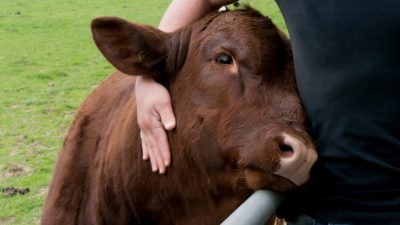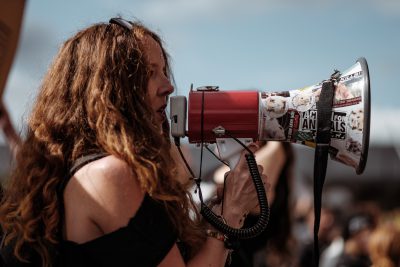This year, 73 Cows won a BAFTA award for a short film. It documents the decision taken by British beef farmers Jay and Katja Wilde to give up farming animals, as they came to terms with the suffering they had caused, and tried to find a new way to keep the farm running and make a living. It is a heart-wrenching film.
What Changed?
Vegan activist Genesis Butler met the couple in January. “What made you stop slaughtering animals?” she asked them.
Jay replied: “Being small farmers we generally took one or two at a time to be slaughtered. To abandon them, which is what you did, at this terrifying place, it felt like a betrayal.”
Genesis asked: “Could you tell that they were scared?”
And Jay told her: “Yes, I’m sure they were.”
Jay and Katja could no longer stomach the idea of being part of such suffering, and they made a big decision: to let their last herd live. Today, seventeen cows remain with them at their farm as “beloved pets”, while the remainder are at Hillside Animal Sanctuary, where they will live out their days.
Farmers Are Switching to Growing Plants
This is an outstanding story, but it is no longer unique. In January, a sheep farmer from Devon drove his lambs to Goodheart Animal Sanctuaries instead of to the slaughterhouse. Sivalingam Vasanthatumar, who had been a farmer for 47 years, said he could not bear putting the animals through the stress: “I just couldn’t cope anymore, and I had to say no.”
A few weeks later came another report, this time from Sussex where former beef farmers made the decision to stop farming animals and instead focus on fruits and vegetables. This was a business decision, rather than one driven by personal ethics, and shows that progressive farmers with an eye to the future can see that plant-based eating is set to rise and rise, and farmers will have to adapt to this changing market.
Today, Farmers for Stock-Free Farming is helping many more farmers move away from farming animals.
Veganism is growing so fast in the UK that all figures are out of date almost as soon as they are published. This January, more than a quarter of a million people pledged to go vegan for January in the annual Veganuary initiative. The charity’s surveys suggest that around two-thirds of those who take part stay vegan, while almost all the others significantly reduce their consumption of animal products. In 2016, the number of British vegans was put at 540,000. Today, that figure is likely to have doubled and it’s a trend that is replicated around the world.
Broken food system
Like everyone else, vegans rely on farmers to grow food, but our current system of farming—based on exploiting animals—is driving climate breakdown, deforestation, species loss, and antibiotic resistance while raising the chances of a global pandemic.
There is a better way. We can eat delicious, nourishing foods that are kind to us, gentle on the planet and spare the suffering of billions of animals.
We can all start eating plant-based to save the planet! Download your Vegan Starter Kit here.
https://www.facebook.com/milliondollarvegan/videos/2221541631417365/



